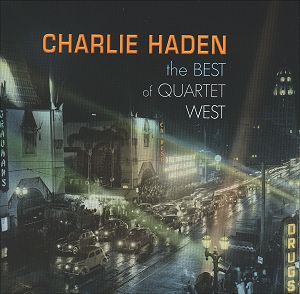1. Hello My Lovely
2. Body And Soul
3. First Song (For Ruth)
4. Our Spanish Love Song
5. Always Say Goodbye
6. Où Es Tu, Mon Amour?
7. Here's Looking At You
8. Alone Together
9. The Left Hand Of God
10. Lonely Town
11. Moonlight Serenade
12. Wayfaring Stranger
Charlie Haden – Bass, vocals
Alan Broadbent – Piano
Ernie Watts – Tenor sax
Larance Marable – Drums (tracks 1, 3-12)
Billy Higgins – Drums (track 2)
Stephane Grappelli – Violin (track 6)
Shirley Horn – Vocals (track 10)
Murray Adler – Violin solo (track 10)
Charlie Haden formed his
Quartet West in 1985, and named it because
he had moved back to Los Angeles from New
York in 1980. Haden has played with many avant-garde
musicians, including Ornette Coleman, Archie
Shepp, Don Cherry and Roswell Rudd, but the
music of Quartet West is more conventional
– even, at times, slightly old-fashioned.
This mirrors Charlie's obsession with film
noir: the movies starring Humphrey Bogart
and his contemporaries. In fact the titles
of some tracks on this album reflect this
interest.
Yet the music is not hard-hitting:
on the contrary, it is generally understated
and introverted, consisting predominantly
of slow ballads. The downside to this is that
some of the tunes sound like slushy background
music rather than jazz pieces. Here's Looking
at You and The Left Hand of God
use lush string arrangements which dilute
the jazz content. However, Ernie Watts's theme
statement on the former track is emotionally
expressive. In fact Ernie's playing is the
most vibrant aspect of this album, since he
can be eloquently lyrical in a ballad like
First Song but he also adds a muscular
edge to tracks like Hello My Lovely.
Alan Broadbent is another enterprising player
whose solos add to the appeal of several tracks.
Charlie Haden's own bass
playing is less exciting. He states the themes
of Alone Together and The Left Hand
of God rather dourly. The former merges
unaccountably into Jo Stafford's vocal version
of the song, recorded in 1945 with Paul Weston's
orchestra. It reminds us of that Jo was a
fine vocalist but her presence is mystifying.
Moonlight Serenade is just as puzzling:
introduced on bass by Haden in a way that
doesn't necessarily make the tune clear (in
fact it sounds more like Embraceable You
or Dancing in the Dark), until the
tenor sax enters for the middle eight to make
things clear. Charlie even tries singing on
Wayfaring Stranger, where his tremulous
uncertainty fits the mood but hardly passes
for jazz.
Like most of Charlie Haden's
work, this album is never less than interesting,
but I found it slightly less than uplifting.
Tony Augarde
